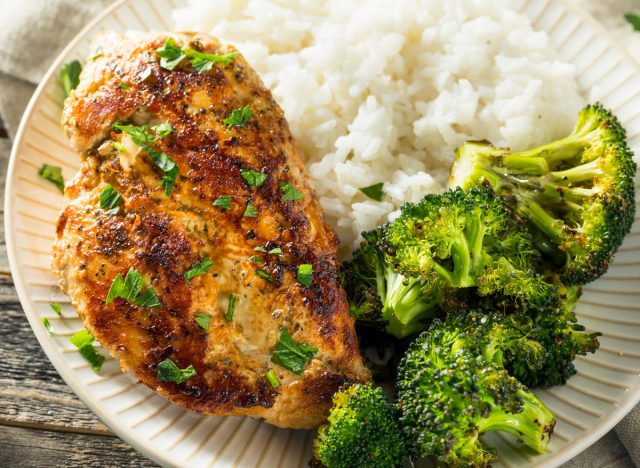Protein is one of the four macronutrients you need each day to keep you satisfied, promote muscle growth, and maintain your overall health. But while your daily protein needs can vary based on factors like your activity level and age, knowing how much to eat at one time is essential to avoid overloading your body and setting yourself up for health problems.
To find out the ideal amount of protein per meal, we spoke to a registered dietitian Gabrielle Tafur, dietitianand doctor of preventive medicine Dr. Cedrina CalderThey explain exactly how much protein you should eat per meal so you can avoid overdoing it.
So how much protein is too much in one meal? Here’s what the experts have to say. Read on, and for more, be sure to check out the 15 Best High Protein Foods for Weight Loss.
How much protein is too much in one meal?

Both Tafur and Dr. Calder agree that it is best to limit protein intake to 30 grams per mealConsuming more than this will usually not provide additional benefits and may strain your kidneys.
Contrary to carbohydrates or lipidsthat your body can store for energy, protein doesn’t have the same storage system. Once your body has taken in what it needs, any excess is usually excreted in the urine. “Protein is never stored and is never meant to be used for immediate energy,” Tafur says.
However, research suggests Even though the body can’t store protein, that doesn’t mean eating more than 20 to 25 grams per meal is always a waste. Some extra protein can still promote muscle growth, especially when it comes from slower-digesting sources like whole foods and is consumed alongside other nutrients.
For those looking to maximize muscle growth, a good tip is to aim for about 20 to 40 grams of protein per meal, spread over four meals per day. Higher intakes may be beneficial for some people, but individual needs may vary based on goals and activity level.
The risks of excessive protein consumption
While protein is essential for building muscle and keeping you full, consuming too much can lead to problems. Here are some risks to keep in mind if you’re loading up on protein.
- Kidney elongation: Although carbohydrates can be stored as glycogen For quick energy during intense activity, protein doesn’t work the same way. Consuming excess protein on a regular basis can put undue strain on your kidneys, making them ineffective and potentially harmful in the long run. “When we consume excess protein, it adds more work to the kidneys to filter it out of the body so that the protein doesn’t build up inside,” Tafur says.
- Weight gain: Eating more protein than your body needs can also lead to weight gain. “The human body stores excess calories as fat,” Calder says. “In other words, if a high-protein diet increases your daily calorie intake to the point where it’s greater than your daily calorie expenditure, you’ll gain weight as a result.”
- Digestive problems: Excessive protein consumption, especially from certain sources like red meat, can lead to digestive problems such as constipation or bloating.
Keeping your protein intake balanced and within recommended limits helps you avoid these potential risks while still enjoying the benefits.
How much protein should you eat daily?


THE Dietary Reference Intakes (DRI) It is recommended to consume 0.8 grams of protein per kilogram of body weight (about 0.36 grams per pound). If your goal is to build muscle, this amount can increase to about 1.5 grams per kilogram of body weight, combined with a balanced diet.
For example, a 140-pound person would need a minimum of 50 grams of protein per day, increasing to around 95 grams if focusing on muscle building.
Protein needs may also be higher for older adults, those recovering from illness, and those with high activity levels. Ultimately, the amount of protein you need each day varies from person to person and depends on several factors.
The best sources of protein


Calder and Tafur agree that the best protein comes from whole foods. Here are some examples of healthy protein sources:
- Lean meat
- Fish
- Nuts and nut butters
- Seeds
- Unprocessed soy products
- Protein powder
High-quality protein powders are a great way to add protein to your diet. What’s the best protein powder? One that’s plant-based and contains minimal preservatives and sweeteners. Plant-based protein powders can typically provide up to 20 grams of protein per serving. Blend a scoop of protein powder with oat milk, berries, and a handful of spinach for a vitamin- and protein-packed smoothie.
“Using protein powder is an effective way to supplement your diet to ensure you meet your daily intake goals,” says Calder. “However, you should aim to get the majority of your daily protein intake from whole food sources.”
Key Takeaways: Don’t Overeat Protein
Consuming more than 30 grams of protein is an excessive amount for a single meal, as your kidneys will process and eliminate any excess. In other words, you could be throwing away your hard-earned money if you try to ingest more than that in an hour, as protein cannot be stored in the body for later use.
Spreading your protein intake out over several meals is the best way to ensure your body is fully utilizing what you’re consuming. For example, instead of pairing a protein shake with a big dinner, save it for after your workout or enjoy it as a midday snack. By managing your intake throughout the day, you can avoid the pitfalls of overeating protein while still achieving your health and fitness goals.
#Protein #Meal #Eat




